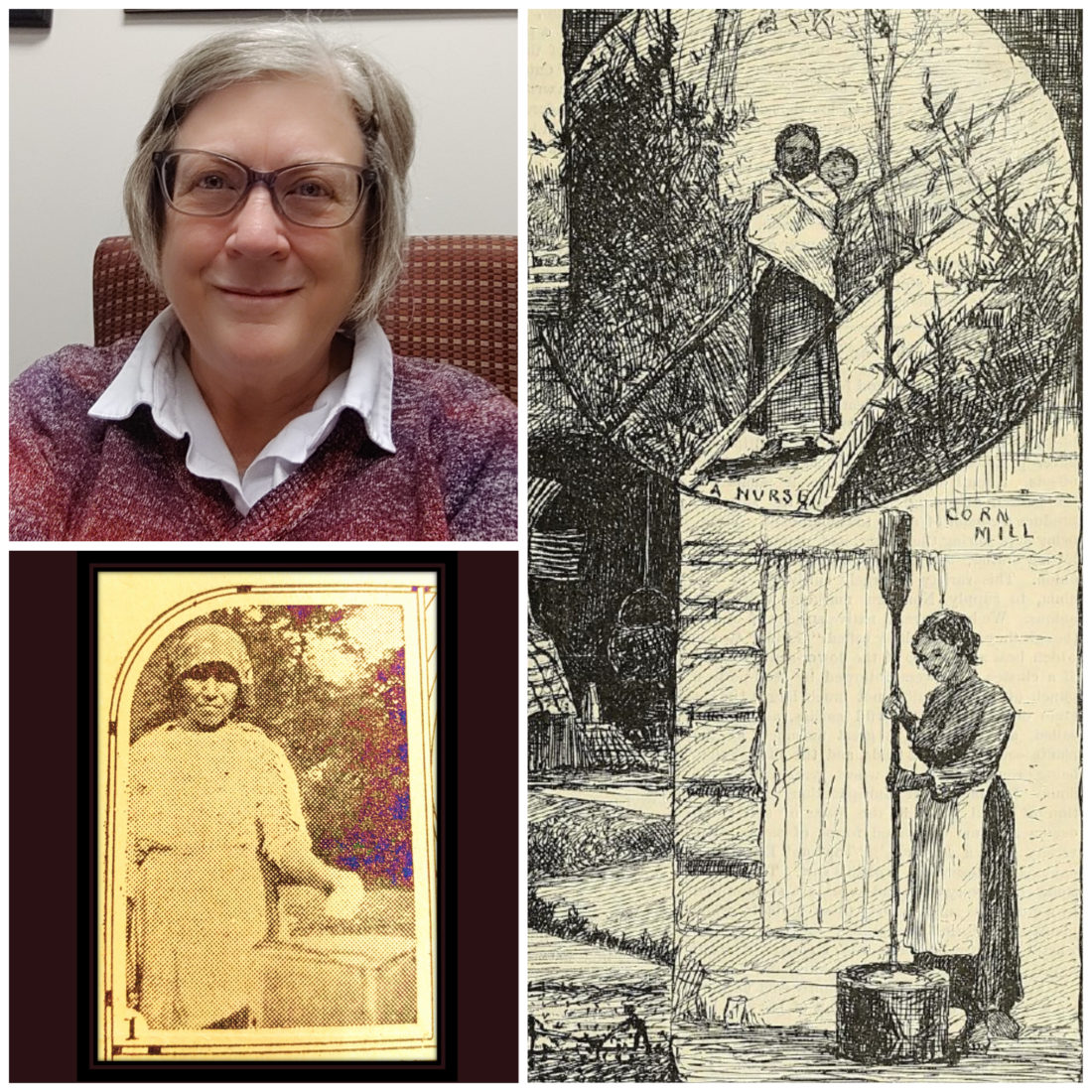Susan Abram’s commitment to Cherokee research, particularly the roles that women have played within the culture, could be an inspiration for anyone passionate about a particular topic.
The findings by the independent scholar and visiting instructor at Western Carolina University are the focus of “Cherokee Women in Resistance and Activism: Valleytowns to the Voting Booth,” a live Zoom webinar presented by the Western North Carolina Historical Association on Thursday, March 10. But her interest in these subjects has been in motion for decades.
Community asset
A native of Indiana, Abram has lived primarily in the WNC community of Whittier since 1989, where she and her husband, R. Michael Abram, raised their two children, “and are now blessed with six grandchildren, a cat and minidachshund,” the historian says.
“We initially planned to honeymoon in Florida and never made it past the beautiful Western North Carolina mountains, where we began our extensive collection of Cherokee arts and crafts,” Abram continues. The couple exhibited their collection at the Cherokee Heritage Museum and Gallery at Saunooke Village in Cherokee for over 25 years, until its closing in 2010.
During that time, Abram went back to school, eventually earning her doctorate in history from Auburn University. Along with her current position at WCU, she is the author of the 2015 book Forging a Cherokee-American Alliance in the Creek War: From Creation to Betrayal and is the secretary of the Trail of Tears Association’s North Carolina chapter, where she previously served as executive officer.
“The NCTOTA’s mission is to support the Trail of Tears National Historic Trail, one of only two historic trails dedicated to the history of Native peoples in the United States,” she says. “Our mission is to promote, protect and preserve the trail, along with raising awareness of the trail’s historical legacy within North Carolina.”
In September, the group will host the National TOTA Conference and Symposium at Harrah’s Cherokee Casino Resort in Cherokee. Abram says that tribal peoples, dignitaries, scholars, students, TOTA members from chapters in nine states as well as community members will attend these social and educational events.
“I am blessed to have worked within the Cherokee community for decades and consider many my family and friends,” Abram says. “A few years ago, one of our grandsons, an enrolled member of the Eastern Band of Cherokee Indians, was chosen to participate in the annual Remember the Removal ride, a journey of more than 900 miles that follows the Trail of Tears to Indian territory in present-day Oklahoma, the home of the Cherokee Nation.”
Years of the woman
Abram’s upcoming WNCHA talk is the culmination of new research she’s conducted over the last several years. In 2018, she spoke at the Southern Association for Women Historians conference about Valleytown Cherokee women during the Trail of Tears. Part of the presentation examined government rolls taken prior to the removal.
“I was intrigued about the number of households led by a woman,” she says. “Past scholars of Cherokee history note that Cherokees residing in the mountains were the most ‘backward,’ staying more traditional. The evidence, however, does not support this thesis.”
The presentation was well received, leading Abram to continue her research. With the excitement over the 2020 centennial for women’s suffrage and the passage of the 19th Amendment, she began looking at how those changes affected Cherokee women. She soon uncovered documentation of the first woman to vote in an EBCI tribal election in the 20th century, which she plans to further discuss at her upcoming WNCHA presentation — her first such talk in several years.
“COVID-19 has resulted in the cancellation of many conferences around the nation, including the TOTA conference that has twice been rescheduled,” Abram says. “I have been invited to several other virtual conferences, both as an attendee and participant, but declined at the time. So, this is very special to me.”
The webinar will shed further light on a notoriously difficult time for Cherokee people, whose society was traditionally based on matrilineage. During the centralization of the Cherokee Nation, however, men’s roles became more prominent, but Abram notes it was women who held their families together and helped to rebuild their lives.
Of the few accounts that exist, the importance of women in the community and tribe is clear. Abram is excited to share these findings, and though the presentation will take place during Women’s History Month, she encourages everyone to avoid limiting such mindfulness to a mere monthlong federal recognition.
“It is important to not just think about Native American history in November or about Native women only during March,” Abram says. “To study Cherokee history is to study the history of our state, region and nation, and this should also be the instance if vice versa. One cannot separate them, though it is often done separately or just completely ignored.”
WHAT: Cherokee Women in Resistance and Activism
WHERE: Zoom webinar, avl.mx/b95
WHEN: Thursday, March 10, 6 p.m. Free-$10



Before you comment
The comments section is here to provide a platform for civil dialogue on the issues we face together as a local community. Xpress is committed to offering this platform for all voices, but when the tone of the discussion gets nasty or strays off topic, we believe many people choose not to participate. Xpress editors are determined to moderate comments to ensure a constructive interchange is maintained. All comments judged not to be in keeping with the spirit of civil discourse will be removed and repeat violators will be banned. See here for our terms of service. Thank you for being part of this effort to promote respectful discussion.